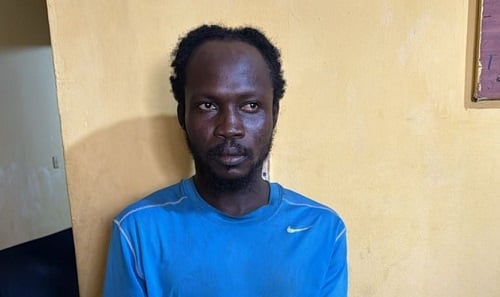David Kwodow Prah Afful, a social media personality known as Kwame Nkrumah II, has been sentenced to seven months in prison for issuing death threats against high-ranking Ghanaian officials, including former President John Dramani Mahama, Members of Parliament, and other government figures. Afful’s threats, delivered during a TikTok livestream, also extended to journalists and civil servants, creating a climate of fear and raising concerns about potential violence. His arrest, which took place near Kasoa Market, followed a swift response from the Ghana Police Service, demonstrating a commitment to upholding public order while acknowledging the importance of free speech. Afful’s case underscores the burgeoning issue of online threats and hate speech, amplified by the reach and immediacy of social media platforms.
Afful’s actions during the livestream went beyond mere criticism of the government. He explicitly threatened to kill officials, singling out those using official green number plates as targets. This specific threat suggested a premeditated intention to target government vehicles and personnel, raising the alarm about the potential for targeted violence. Beyond threats against individuals, he also advocated for widespread acts of arson, urging viewers to set fire to marketplaces, which would have devastating consequences for both local businesses and the wider community. This incitement to large-scale violence escalated the severity of his actions and further underscored the potential for his rhetoric to incite real-world harm.
The Ghana Police Service acted decisively in apprehending Afful, demonstrating a commitment to maintaining public safety and preventing the escalation of violence. Their statement following the arrest affirmed the right to freedom of speech while drawing a clear line against expressions that incite violence, insecurity, or public disorder. This delicate balance is crucial in a democratic society: protecting the right to express dissent while also ensuring that such expressions do not translate into real-world harm. Afful’s case illustrates the challenges faced by law enforcement in navigating this complex terrain, particularly in the age of social media, where incendiary rhetoric can rapidly spread and potentially incite violence.
Appearing before an Accra Circuit Court, Afful pleaded guilty to charges of threat of death and offensive conduct likely to disturb public peace. This admission of guilt signaled a recognition of the severity of his actions and their potential consequences. He expressed remorse and appealed for forgiveness from the government officials he had threatened, suggesting an understanding of the fear and anxiety his words had caused. Though the court acknowledged his plea, the seven-month prison sentence reflects the seriousness of the offenses and the need to deter such behavior, especially in the context of rising political tensions and the potential for violence.
The case of Kwame Nkrumah II serves as a cautionary tale about the potential dangers of online rhetoric. Social media platforms, while offering valuable avenues for communication and expression, can also be misused to spread hate speech, incite violence, and threaten individuals. The immediacy and reach of these platforms amplify the impact of such rhetoric, requiring a vigilant response from both platform providers and law enforcement agencies. The incident highlights the need for greater accountability for online speech and the importance of fostering a culture of responsible online behavior.
Furthermore, Afful’s case raises broader questions about the role of social media in political discourse and the potential for online platforms to be exploited for malicious purposes. As social media becomes increasingly integral to political communication, it is essential to establish clear boundaries regarding acceptable online behavior and to develop effective mechanisms for identifying and addressing threats of violence and hate speech. Striking a balance between freedom of expression and the need to protect individuals and maintain public order is a critical challenge for societies navigating the evolving digital landscape. The case of Kwame Nkrumah II underscores the urgency of this challenge.














